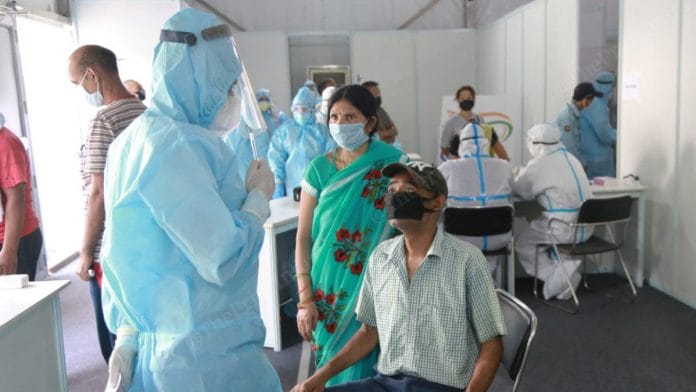New Delhi: Scientists across the world continue to study the novel coronavirus, understand its pathology and find treatments to manage Covid-19.
Here are some of the latest scientific findings about the disease.
Sweden’s attempt at Covid herd immunity shows no success
Sweden’s strategy of letting Covid-19 infection spread in a controlled manner in order to achieve herd immunity has failed, according to a study published in the Journal of the Royal Society of Medicine.
Instead of imposing a strict lockdown in March, like most countries did, Sweden relied on its citizens’ individual responsibility to curtail the spread of Covid-19.
The health authorities earlier predicted that 40 per cent of Stockholm’s population would have had the disease and acquired antibodies by May 2020.
However, results from a recent sero surveillance study showed that only 15 per cent of the country’s population has developed antibodies. Moreover, compared to other European nations, Sweden has higher infection numbers, hospitalisations and death rates, the researchers have said.
They, however, also said that only after one or two years — once the pandemic and impact of measures taken are fully understood — can people fairly judge what was done correctly by nations across the world.
Also read: Effective contact-tracing, testing must if schools are to be reopened, Lancet studies say
Why certain organs remain unaffected by Covid-19 virus
A team of scientists have created a model which may explain why in severe cases of Covid-19, the virus does not damage all organs.
To enter human cells, the SARS-CoV-2 relies on interactions with a protein called angiotensin-converting enzyme 2 (ACE2), which is abundantly present throughout the body.
Despite the virus’ presence in all organs, it only affects the lungs, heart, liver, kidneys and parts of the neurological system.
The researchers have said that this could happen because the virus uses a different pathway for its transmission. To find an alternate route of transmission of the virus within the body, the team simulated how proteins in the lungs interact with those in other organs.
The study said that proteins in a cell face several obstacles while interacting with each other. Taking this into account, the team developed a mathematical model and identified a group of 59 proteins within the lungs that act as primary activators affecting other organs.
A chain of interactions possibly determine how the virus affects the rest of the organs, the researchers have noted.
Targeting some of these proteins in the lungs with existing drugs may prevent multi-organ failure in Covid-19 patients.
Commercial mouthwashes can inactivate SARS-CoV-2
Commercially available mouthwashes can inactivate SARS-CoV-2 viruses in cell culture, a study has found. Researchers from the Ruhr-Universität Bochum in Germany have suggested that use of mouthwashes can possibly reduce the risk of coronavirus transmission over a short term.
Viral loads can be detected in the oral cavity and throat of some Covid-19 patients. However, the researchers caution that mouth rinses are not suitable for treating Covid-19 infections or protecting one against catching the virus.
For the study, published in the Journal of Infectious Diseases, researchers tested eight mouthwashes with different ingredients available in Germany.
They mixed each mouthwash with virus particles and a substance that mimicked the effect of saliva in the mouth. The mixture was then shaken for 30 seconds to simulate the effect of gargling.
All of the tested preparations reduced the initial virus levels, with some reducing virus levels to nearly zero.
However, whether this effect is confirmed in clinical practice will only be clear with further studies, which the team is now planning to carry out.
Minorities underrepresented in Covid-19 clinical trials
Covid-19 disproportionately affects people of colour and minority groups, it has been found. Despite this, several vulnerable groups are being underrepresented in Covid-19 clinical trials, according to a paper published in the New England Journal of Medicine.
Researchers from the University of Georgia and University of Colorado have said that those involved in Covid-19 research must diversify study participants in order to be able to generalise results to a larger population.
For example, a US trial for testing the efficacy of remdesivir, Black Americans accounted for 20 per cent of the total patient population. In another Gilead-funded clinical trial of the drug, only one out of every 10 patients who were given remdesivir were Black. Latinx and Native Americans comprised 23 per cent of the former trial and less than 1 per cent in the latter.
The remdesivir trials have shown that patients who were given the drug recovered from Covid-19 slightly faster than those who received placebos. But people of colour often experience more severe symptoms and complications from the disease. It remains undetermined whether they will respond similarly well to the medication.
Also read: Countries with BCG vaccine policy have slow Covid infection and death rates, US study finds






